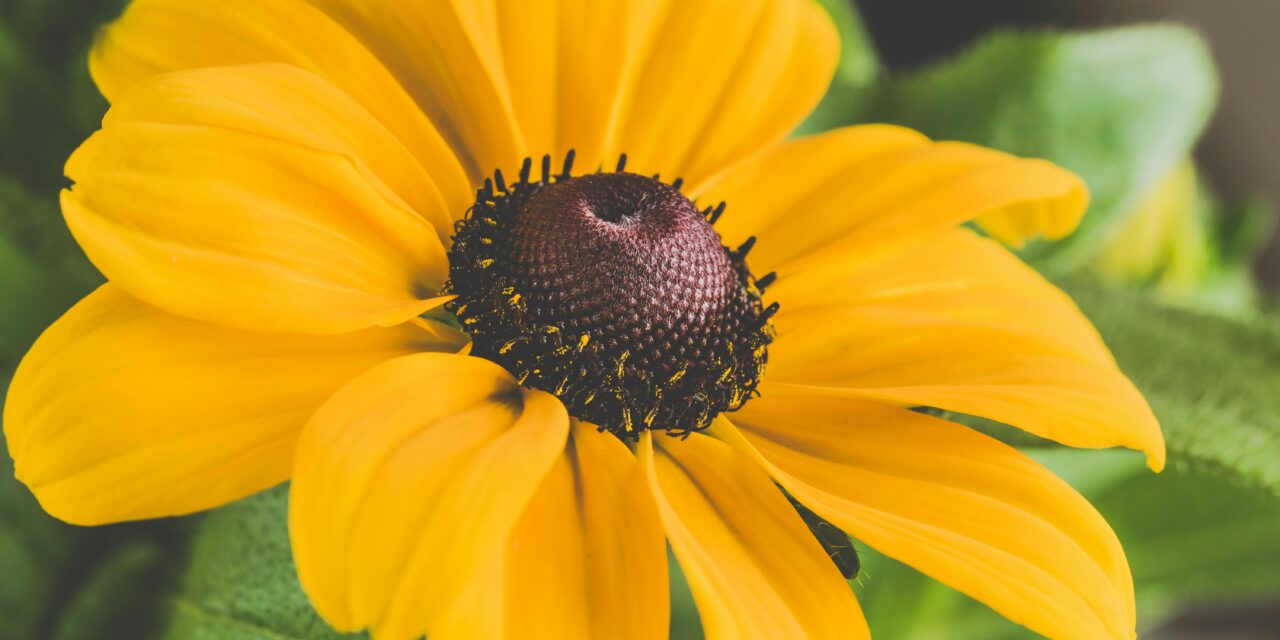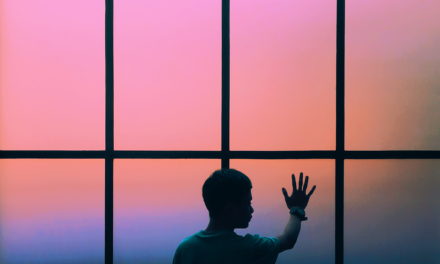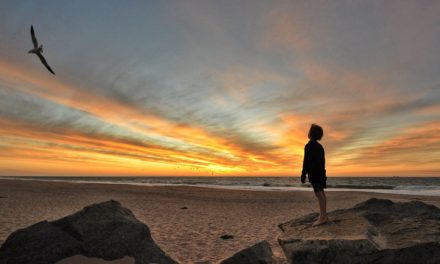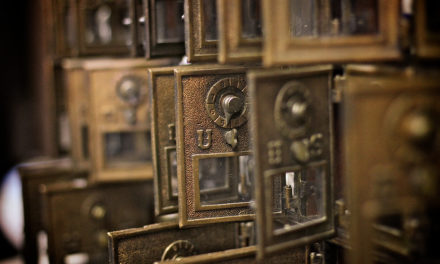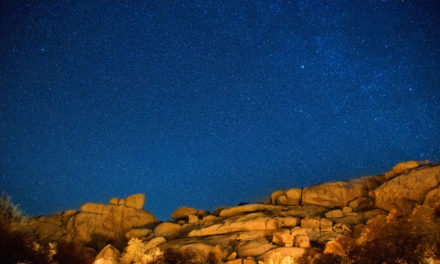He never would have imagined his name there, neatly printed on a small folded card on the altar of the Zen meditation hall.
SAMUEL DAVID SEE
It shared the shrine with a towering bronze Manjushri, a scowling deity wielding a flaming sword in his raised right hand. Surrounding Sam’s card was a cluster of the white cards, each folded in half and bearing the name of someone who had recently passed, like a little graveyard of shining headstones on the candlelit polished wood.
Dad had died just ten days before the October retreat, and after some soul searching I decided I still should go to the Upaya program. I longed to commune with silence, to sit zazen, facing the white wall of my grief.
On the first day, I filed into the Zendo with 50 or 60 other meditators, seating myself quietly on a round navy blue cushion placed in the center of a rectangular mat next to the wall. Zafus, they called the buckwheat hull-filled cushions, and zabutons the underlying padded mats that lined the Zendo walls, allaying the discomfort of extended zazen.

Dad wouldn’t have recognized any of these Zs, nor thought much of the Buddhist deity who hefted his fiery sword so threateningly. Sam had been a tough Kentucky boy, raised in Louisa, a small town on the edge of Appalachia where coal trains rumbled night and day along the border of his yard, then educated as an electrical engineer at Georgia Tech. His mother, after the untimely death of her husband, became manager of The Bargain Store, but found time to take Sam and his sisters to the Methodist Church every Sunday during their childhood. Still, Sam never would have called himself religious, much less Zen or Buddhist.
But, like me, he would have loved the Black-Eyed Susans along the edge of the circular flagstone meditation walk outside the Zendo. During the retreat, I followed the life cycle of one particular flower from day to day, watching it open from a tight bud to a bright yellow face, then lose petals one at a time until only a drooping brown eye remained. I spoke with a visiting nun, Irene, about the surprising intimacy of my relationship to that flower.
What was the flower made of?? she asked.
Light. I responded to the koan without thinking.
And what are you made of?
Ahh . . . .
Sam’s sacred place was his garden. He spent most Sundays among his roses, pointing out to his three little girls the difference between tea roses, grandiflora, and floribunda. One Christmas, he received some expensive whiskey from a contractor who wanted business from his company, and the next spring Sam exchanged the untouched bottles at the local plant nursery for as many rose plants as would fill the back of the Chevy Brookwood wagon.
Dahlias also captivated him for five or six years; my sisters and I always had several dinner plate-sized blooms for our elementary school teachers every September.
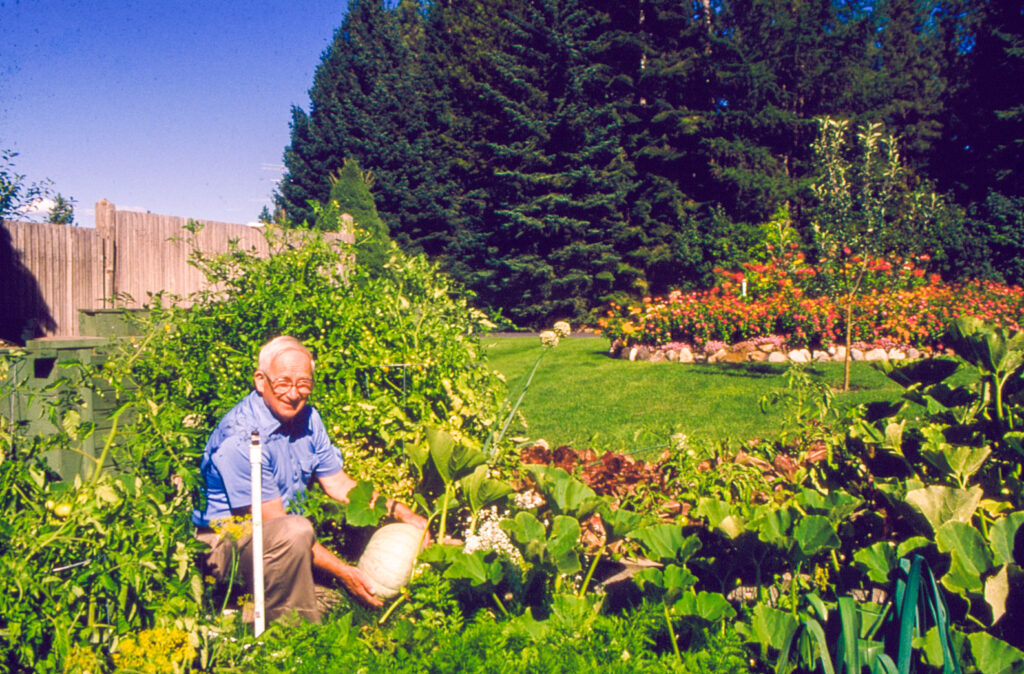
His favorite gardens, though, were his vegetable beds, which fed the family for years. He discovered the Mittleider Garden Method, using a mix of sand, sawdust and organic micronutrients to grow a profusion of vegetables in raised beds—tomatoes, squash and beans that were the envy of the neighborhood.
I couldn’t believe the synchrony, then, when the head novice nun, assigning daily chores to the visitors, passed me over for bathroom cleaning, meal prep or dishwashing, instead steering me towards the center’s vegetable beds. They were dry as bone now, and the old foliage needed to be cleared, the ground raked and cleaned for the turning of the seasons. As I knelt to pull out the crisp tomato vines, I was surrounded by the unmistakable tang of the fruit, and felt a companionable presence spilling over my shoulders like the sun wrapping its warmth around a boulder.
He had been 96 when he died, astute and sharp witted until the end although he was bent with Parkinson’s and shuffled behind his walker. He had bounced back, literally, after a neighbor backing out of her garage hit his walker while he was on the way to the mailbox. He promised he would not inform her insurance company if she baked him a chocolate cake each week for life.
The cakes didn’t come for long. Dad had a premonition that death was near. He was not afraid. He specified the suit he wanted to wear, the matching shined shoes. The last week of his life, he asked to hear once more the final movement—the soaring chorale movement—of his favorite recording of Beethoven’s Ninth Symphony, conducted by Sir John Elliott Gardner, in which his youngest daughter played piccolo.
And he kept looking upward.
What are you seeing, Dad? I repeatedly asked.
He would not say.
He spent his last day with his 30-year-old granddaughter, Megan, at his condo. They chuckled at his See family slides from the 1950s, then ate dinner together—pork chops and fried potatoes, followed by the invariable bowl of ice cream. Dinner with Dad always took a while because of his ill-fitting dentures, but Meg was patient. After dinner, he asked her to pull an atlas from the bookshelf.
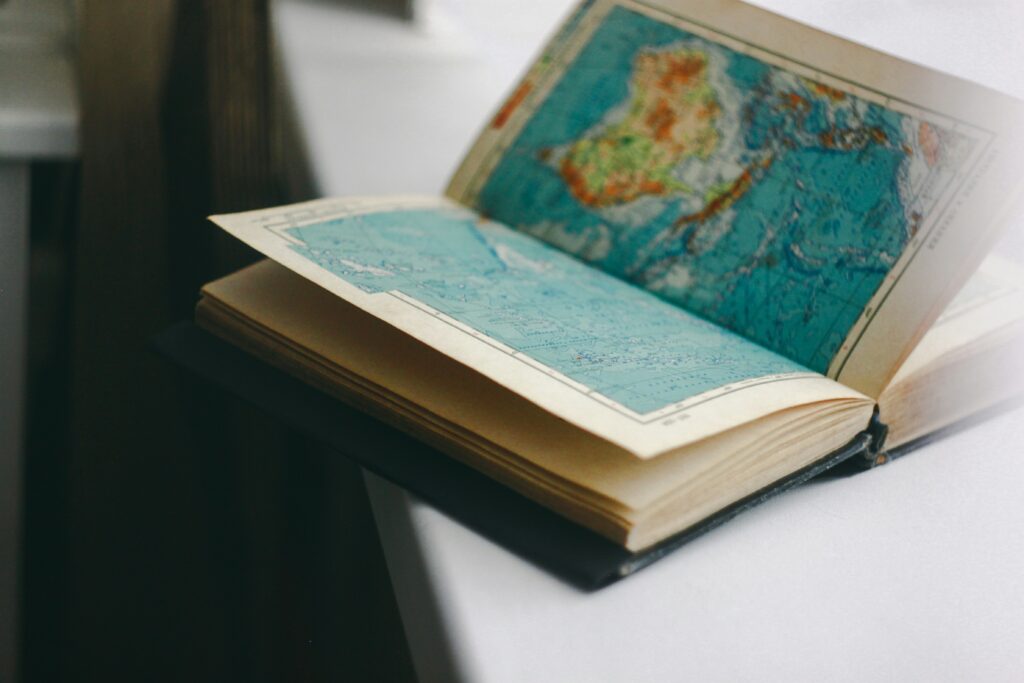
Let’s see how many of the world’s major rivers we can name, he suggested, taking a piece of notebook paper and a sharp no. 2 pencil from a kitchen drawer.
Okay now, the Nile, the Amazon, the Yangtze, the Niger, the Volga, the Yukon, the Rio Grande, the Mississippi, the Ohio . . . . He recorded them in his tiny, cribbed Parkinson’s handwriting. Not long after, he went to bed, wearing his favorite pajamas and the new striped slipper socks Megan had brought him that afternoon.
Cutting down the dead corn stalks in the Upaya gardens, sadness constricted my throat as I remembered him on his deathbed—bright blue eyes closed, silky white hair falling over his unlined forehead, strong hands finally at rest.
We were given a free Saturday afternoon the last weekend of the retreat. I decided to walk down along the Santa Fe River that flows in the valley below Upaya. It would eventually merge with the Rio Grande, but in mid-autumn you could almost walk across it on the exposed stones.
Leaves crunched under my feet as I followed the path, trying to be mindful of the earth yielding to each step, breath synchronized with walking, thoughts passing like clouds–to be fully present, experiencing the miraculous rhythms of my own precious life.
After a while the path split, one fork radiating away from the river before turning to rejoin the main route, like the bowl of a “b.” In the middle of the bowl was a single Mesquite tree, about 30 feet high with a broad rounded canopy, now bare of leaves and most of its bean pods.
Indigenous peoples of the Southwest know the Mesquite as the Tree of Life for its ability to tap deeply into water, producing the beans that can be pounded into meal. Like the great Western Red Cedars of the Pacific Northwest, Mesquite was also traditionally used for shelter, fuel, clothing, tools, and medicine.
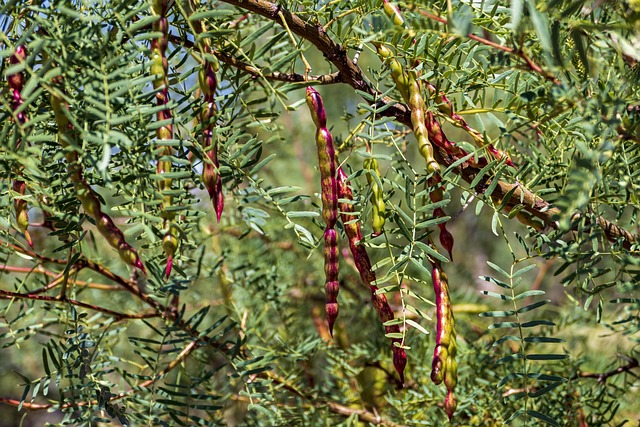
What I saw on the branches of this Mesquite, however, stopped me in my tracks. Someone had decorated the tree with the vestiges of a hospitalization. Paper surgical masks, bandages, tubing, catheters, rubber gloves, syringes, lancets, cotton swabs, and thermometers festooned the branches like Christmas ornaments. They all clearly had come from a sickroom.
I imagined that someone had died, finally freed of fear, pain, midnight “vitals,” endless humiliating bodily intrusions. I imagined the daughter or wife who decided to make a memorial of the beloved’s last days, and scouted the river valley for a place where she could see past these artifacts of his suffering, to his release.
I walked slowly around the tree, noticing, at its base, a number of smooth, round rocks, an inch or two in diameter. Some had been brightly painted with geometric designs, others with child-like images of flowers, stars and the sun. Some were left plain, as though they’d just been plucked from the riverbed.
Dad did not die in a hospital. He had been lucky, lying there in his own bed with his granddaughter beside him as he began his own passage down the River of No Return.
I love you, Grandpa, she had said, squeezing his hand slightly.
I love you too, he replied. And his last words: I love you all.
My eyes now were drawn to a perfectly round, unpainted stone. For some reason I knelt and turned it over.
Sam, it said.

